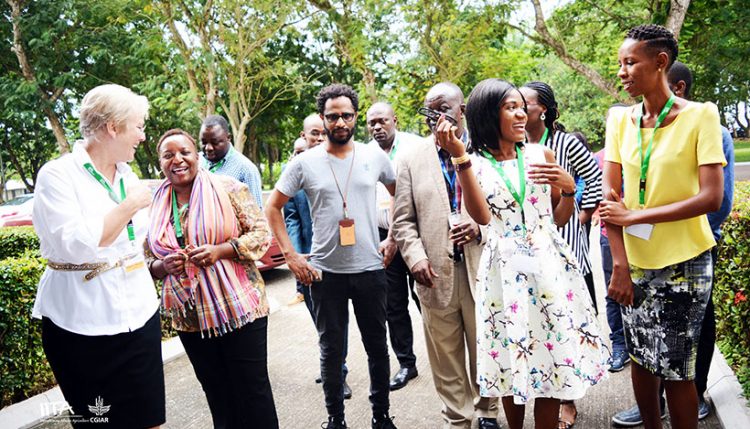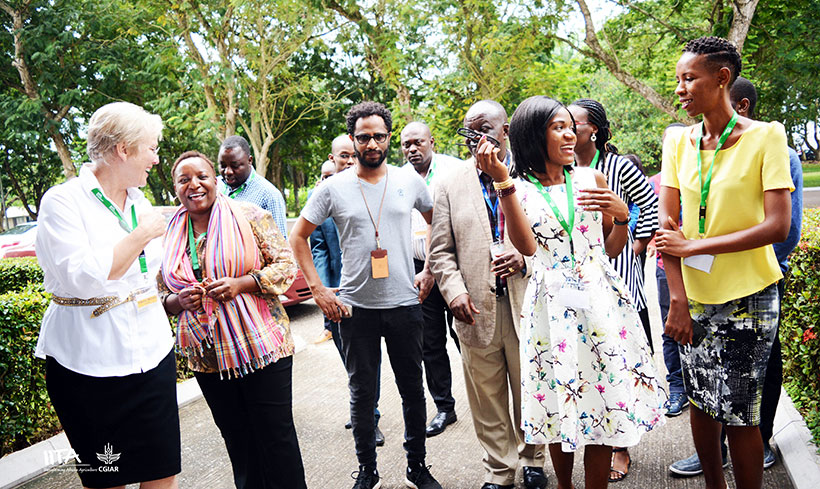
IFAD awardees attest to the importance of youth engagement in agribusiness for economic development in Africa
Some of the International Fund for Agricultural Development (IFAD) fellowship awardees for the scholarship grant on “Enhancing Capacity to Apply Research Evidence (CARE) in Policy for Youth Engagement in Agribusiness and Rural Economic Activities in Africa, during one training course in IITA, discussed the benefits, prospects, and problems their research findings intend to solve in Africa.

IFAD fellowship awardees at a past training
IITA, being the implementing institute of this youth-based research program, has a comparative advantage in youth engagement and agribusiness in Africa with its model of youth and agribusiness being adopted in many countries in sub-Saharan Africa. As of today, the Institute is actively involved in socioeconomic research that has contributed significantly to advance the research agenda and increase the human resource pool in Africa, which includes mentoring and coaching young scholars and youth.
IITA Senior Agricultural Economist for West Africa and Program Supervisor, Tahirou Abdoulaye, encouraged the awardees to tackle the challenge of a lack of research and evidence-based information to guide both policy development and program implementation. “There is an agreement among African leaders and development partners that the transformation of the agricultural sector is of critical importance as it will continue to be the main sector to stimulate economic growth. A strong involvement of Africa’s youth in rural development, agriculture, and natural resource management will boost economic growth in the continent.”
A PhD awardee, Oluwaseun Oginni, from Nigeria, said that the main thrust of his research is to examine the migration of youth from rural to urban areas, and the negative impact it has on agriculture. Concurring, Emmanuel Tolani, A PhD research fellow from Malawi, highlighted the importance of his topic to the development of his country, as he intends to unveil some of the challenges that impede the full participation of youth in agriculture. “My findings will help policymakers to have a better understanding of the factors that influence youth migration from rural to urban areas, and also devise how best to encourage youth to participate in agriculture,” he added.
Rodrigue Kaki, research fellow from Benin Republic, narrated how the knowledge gained from the scientific writing training he attended at IITA would help him develop a policy brief at the end of his research. “This would help to motivate youth to embrace agribusiness as a means of sustaining themselves instead of looking for white collar jobs that might not allow them to discover their real capabilities. Some of these challenges range from economic, social, and environmental factors including inadequate credit facilities, low profit margins from farming, lack of production inputs, low opinion of and negative public perception about farming, inadequate land, and persistent poor harvests,” he added.
This implies that empowering youth to become innovators and ‘agripreneurs’ is a key to solving some of the most binding constraints to the growth of a prosperous agricultural sector, thriving agribusiness value chains, and improved food and nutrition security. The challenge today is to understand the reality of the livelihoods for youth agripreneurs. This component seeks to create new knowledge on challenges as well as to understand the factors of success or failures of young agribusiness entrepreneurs.
